🇪🇪 Estonia vs. 🇳🇱 Netherlands: The Battle for Europe’s Startup Visa Supremacy (2025)
In 2025, Europe’s entrepreneurial landscape is more competitive than ever — with startup founders from across the globe seeking access to EU markets, funding ecosystems, and residency options through specialized Startup Visa programs. Among all offerings, Estonia and the Netherlands have emerged as two leading gateways — each leveraging distinct models of innovation, immigration, and startup enablement.
While Estonia has built a global reputation through its digital-first e-Residency and Startup Visa schemes, the Netherlands positions itself through a facilitator-guided pathway supported by dense urban ecosystems like Amsterdam. This article offers a high-impact comparison — from eligibility, support infrastructure, and success rates, to real-world founder outcomes and regulatory trends — to help you decide: which country offers the most founder-friendly route in 2025?
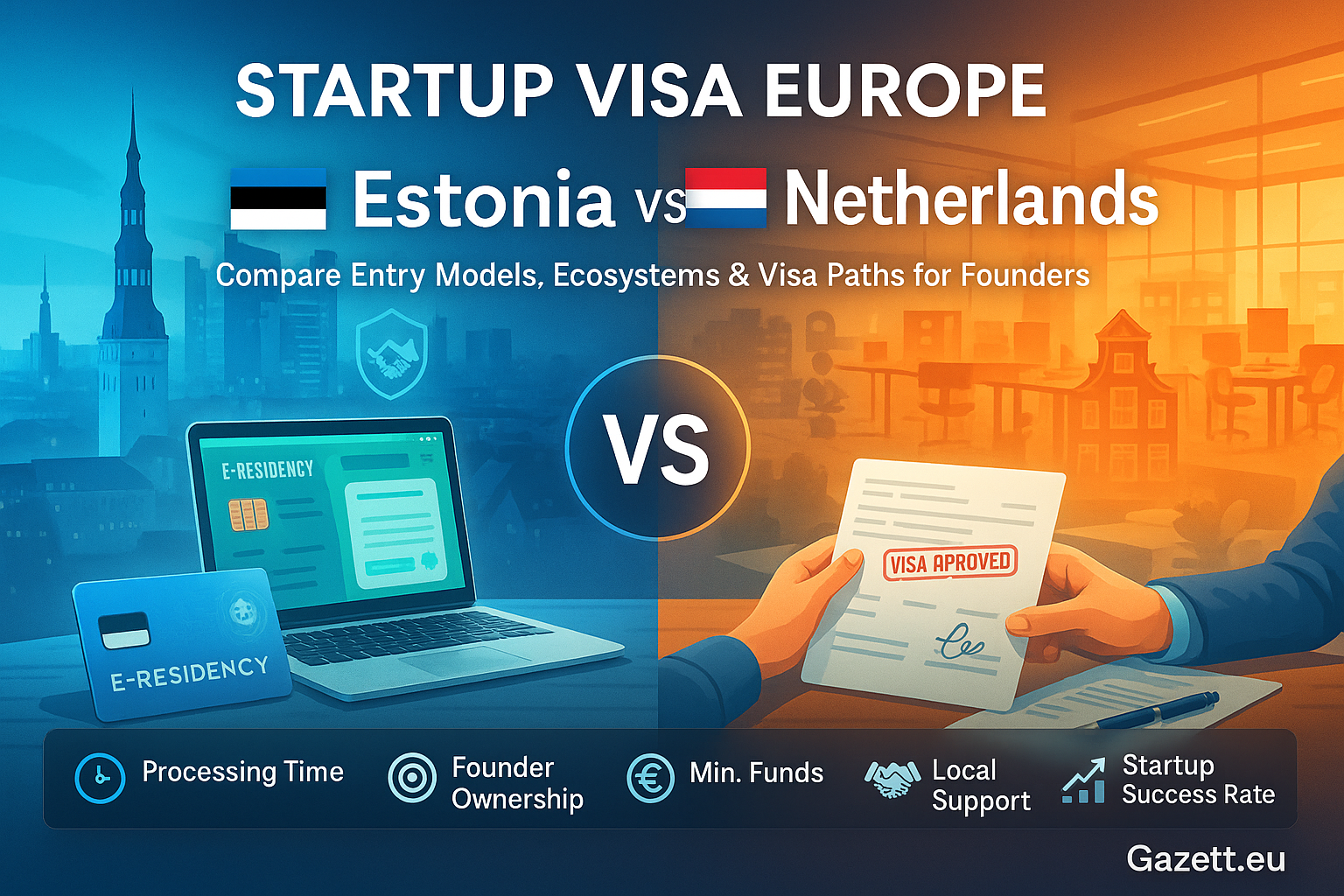
📷 Infographic: Europe’s Startup Visa Showdown – Estonia vs Netherlands 2025 | Gazett.eu
📚 Table of Contents
- 🌍 What Defines a Startup Visa in Europe (2025)
- 🇪🇪 Estonia – Digital-First, Founder-Led Entry Model
- 🇳🇱 Netherlands – Facilitator-Guided Startup Path
- 📊 Visa Comparison – Eligibility, Costs & Speed
- 🌐 Ecosystem Showdown – Tallinn vs Amsterdam
- 👩💻 Real Founder Outcomes & Startup Success Rates
- 🧭 Which Visa Should You Choose in 2025?
- 📋 Visual Matrix + Decision Chart
- 📌 Conclusion – Takeaways, Tools & Links
🌍 What Defines a Startup Visa in Europe (2025)
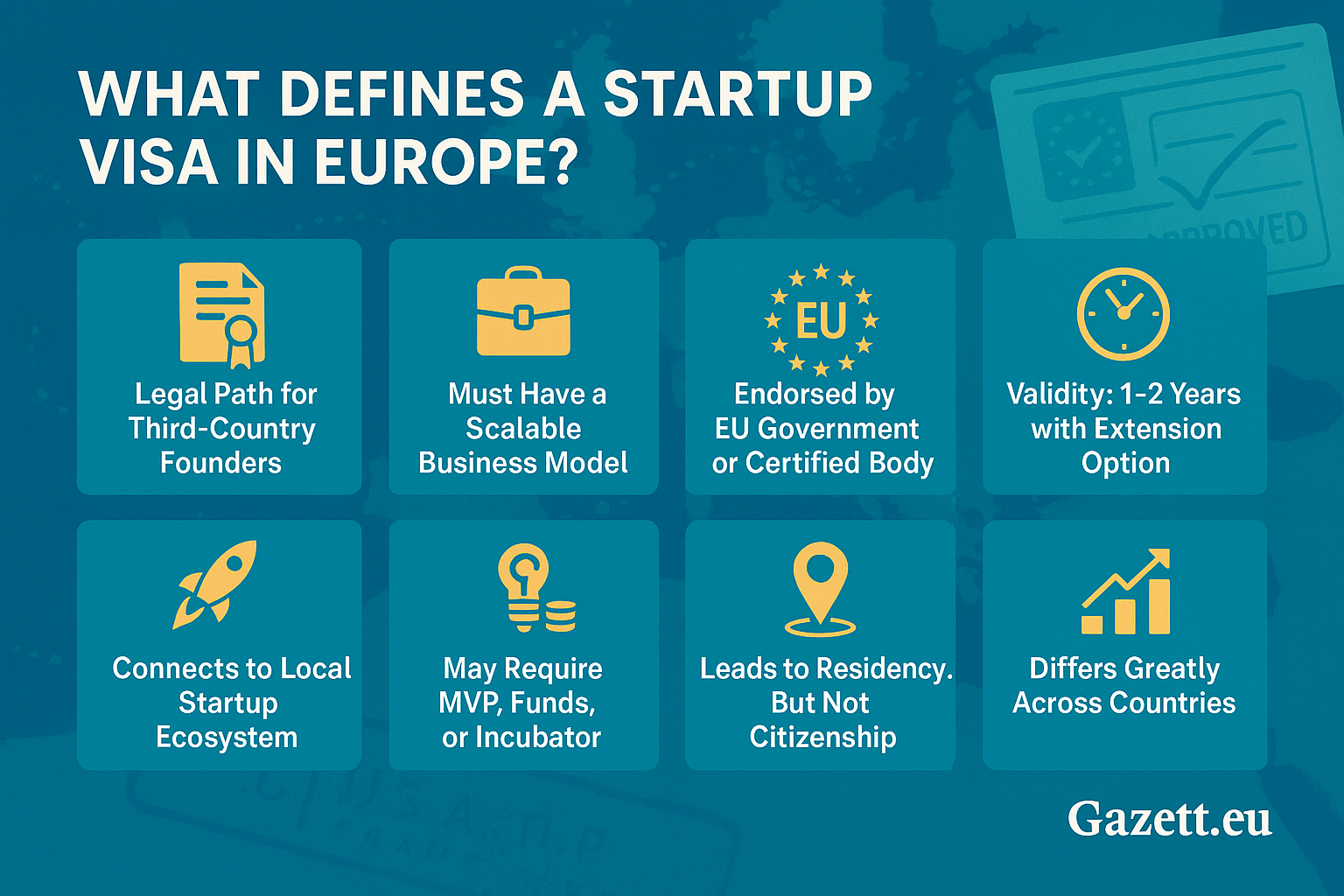
📷 Infographic: What a Startup Visa Means in the EU Context – Founders, Rules & Residency
A Startup Visa in Europe is a government-issued residence permit that enables non-EU entrepreneurs to establish and operate innovative businesses within an EU member state. These visas are designed not only to boost national innovation ecosystems but also to attract global tech talent, stimulate economic growth, and position the host country as a competitive startup hub in the global arena.
While requirements vary by country, most Startup Visa schemes in Europe share a few defining traits:
- 💡 Innovation Criteria: The business must be original, tech-driven, or solving a defined market problem.
- 📈 Scalability Proof: Founders must demonstrate growth potential and economic value (jobs, exports, etc.).
- 📝 Business Plan: A detailed, often pitch-deck-style proposal must be submitted and reviewed.
- 💶 Funding or Financial Self-Sufficiency: Some countries require proof of minimum funds or committed capital.
- 🛂 Temporary Residency: Visas are typically issued for 1–2 years with renewal based on performance and compliance.
- 🌐 Support Linkages: In countries like the Netherlands, an approved local facilitator must endorse the application.
These programs are not designed for passive investors or digital nomads — they are purpose-built for hands-on entrepreneurs ready to launch, register, and actively manage a startup in the host country. In 2025, the policy emphasis is shifting towards founders who can create jobs, raise funding, and contribute to national tech sovereignty.
🔗 Related Reads: Startup Grants & Innovation Incentives in Europe (2025)
🇪🇪 Estonia – Digital-First, Founder-Led Entry Model
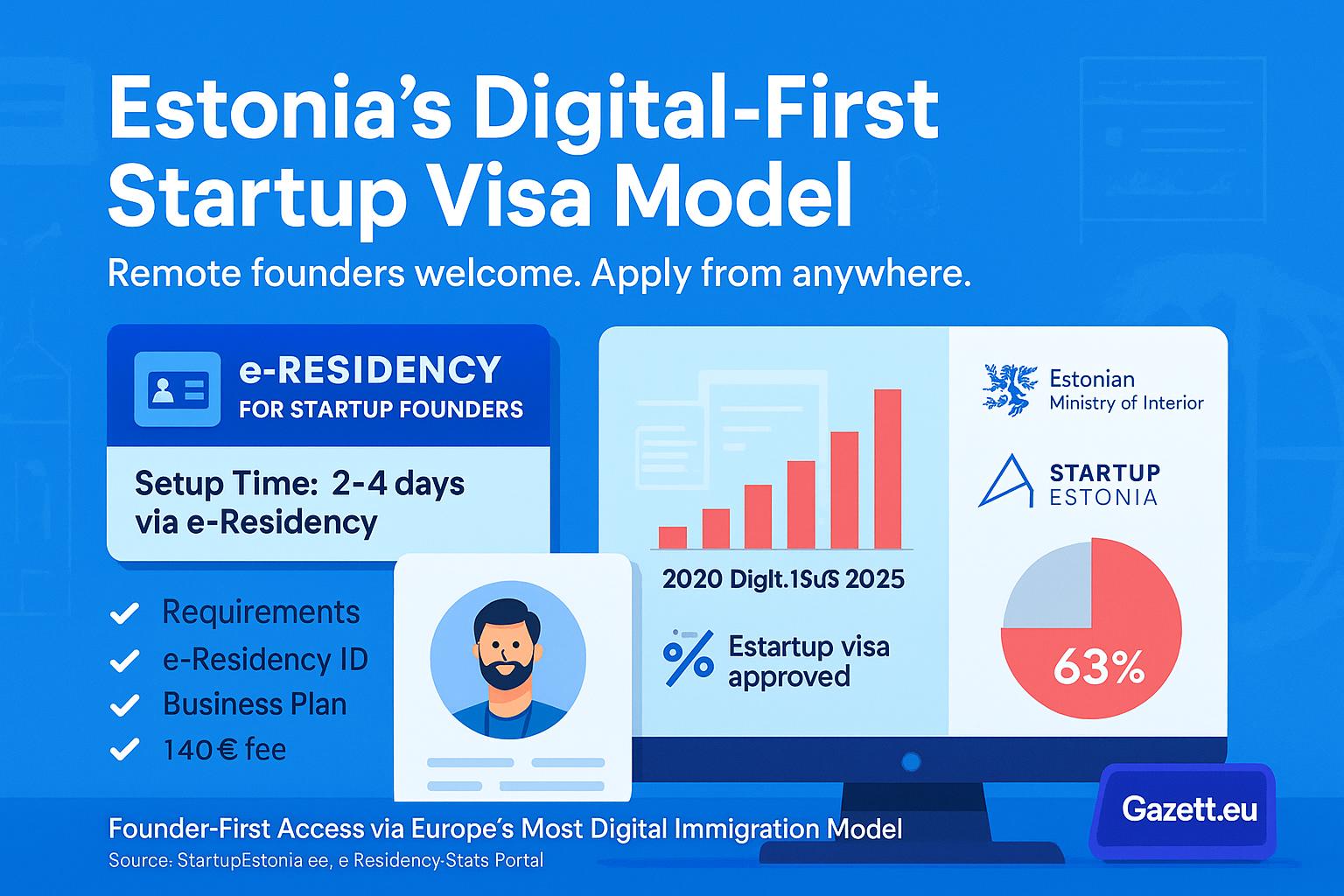
📷 Infographic: Estonia’s Digital Startup Visa Flow – e-Residency, Evaluation, Approval
Estonia’s Startup Visa program, launched in 2017, continues to set the global benchmark for digital-first immigration and startup registration. Targeted at non-EU founders, this visa enables entrepreneurs to build scalable tech companies from anywhere — with the entire process streamlined through Estonia’s e-Governance framework.
The program is coordinated by Startup Estonia in collaboration with the Estonian Police and Border Guard Board. What makes it unique? Founders don’t need a local sponsor or facilitator — making Estonia one of the few fully founder-led visa models in Europe.
📝 How the Estonia Startup Visa Works (2025)
- ✅ Eligibility: Innovative startup idea + scalable tech model + team or solo founder
- 📅 Processing Time: 10–30 working days for review by the Startup Committee
- 💻 Digital Application: 100% online through the official startupestonia.ee portal
- 🎯 Approval Rate: 48% success rate as of 2023, up from 38% in 2021
- 👨💼 Residency: 1-year visa (extendable to 5 years); allows team/family relocation
- 🌐 e-Residency Integration: Can be combined with e-Residency for virtual management
🚀 Strategic Advantages of Estonia’s Model
- 📡 Remote-Friendly Setup: Company can be managed from abroad; e-Residency optional
- 🔓 No Facilitator Needed: Unlike other EU models, direct application by founders allowed
- 📜 Transparent Criteria: Public scoring rubric and clear committee guidelines
- 📊 Open Ecosystem: Access to EstBAN, Startup Wise Guys, and EU seed funding networks
- 🧪 Tech Focused: Highly receptive to SaaS, AI, Web3, and B2B startups
🔗 Official portal: Estonia Startup Visa Program
🇳🇱 Netherlands – Facilitator-Guided Startup Path
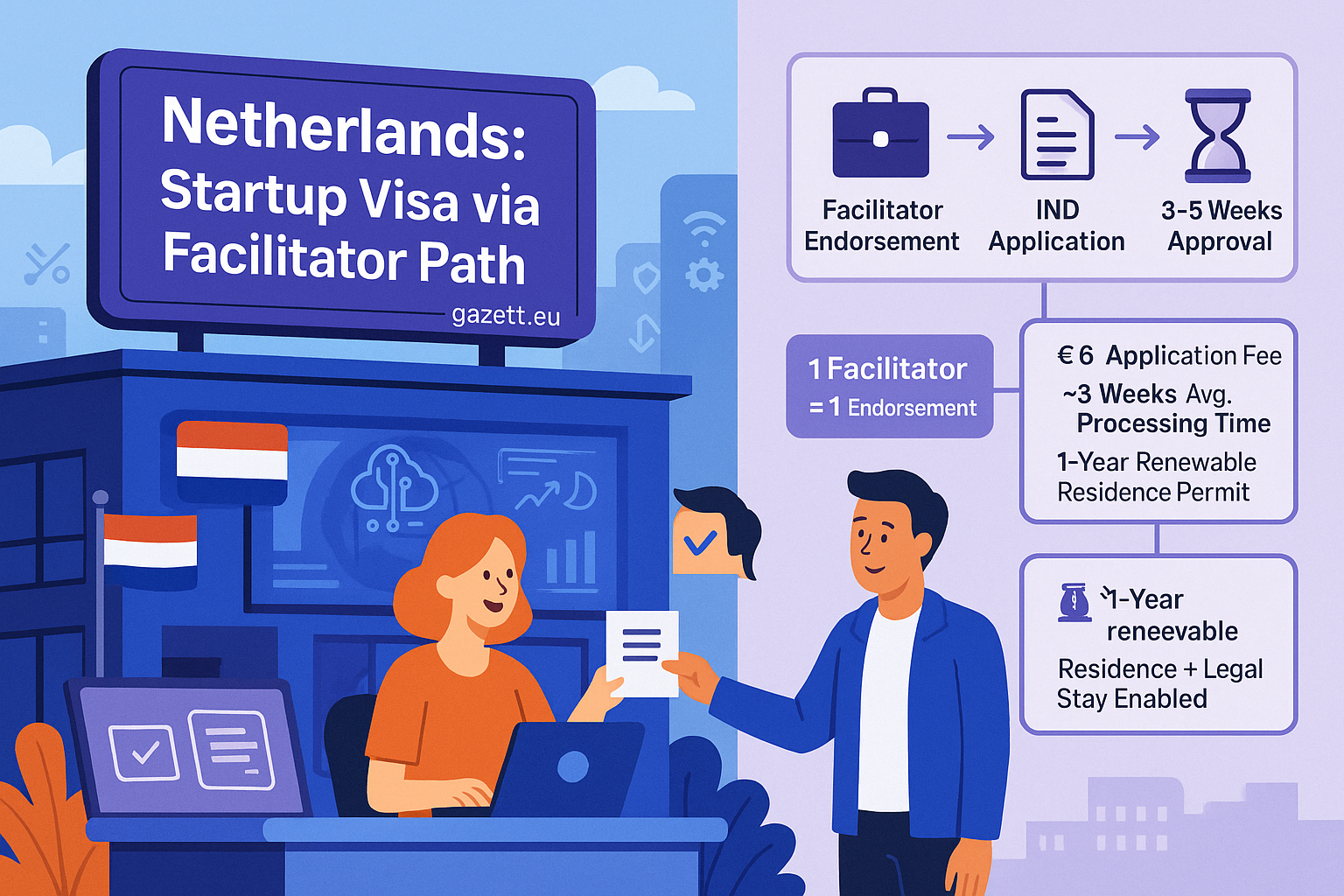
📷 Infographic: Netherlands Startup Visa Model – Facilitator Role, Requirements & Benefits (2025)
The Netherlands offers a globally recognized Startup Visa scheme designed around a unique public-private model: founders must work with a certified startup facilitator — an incubator, VC, or advisory firm — who helps refine the business, monitor growth, and act as a point of contact for Dutch authorities.
Overseen by the Netherlands Enterprise Agency (RVO) and IND, this model emphasizes partnership, mentorship, and a physical presence in the Dutch ecosystem. Amsterdam, Rotterdam, and Eindhoven are the top hubs for founders entering via this route.
📋 Netherlands Startup Visa Snapshot (2025)
- ✅ Eligibility: Innovative business idea + link with certified facilitator
- 📅 Processing Time: 4–8 weeks (after approval from IND and facilitator agreement)
- 👨💼 Residency: 1-year temporary permit, renewable if KPIs are met
- 🤝 Facilitator: Over 45 IND-recognized entities listed publicly
- 💼 Physical Presence: Founder expected to be based in the Netherlands full-time
- 💰 Proof of Funds: Minimum €14,000 in personal resources (2025 benchmark)
🏗️ Support Ecosystem & Startup Advantages
- 🏢 Top Facilitators: YES!Delft, HighTechXL, Startup Amsterdam, UtrechtInc, Rockstart
- 🌍 Gateway to EU Markets: Easy access to trade, IP registration, logistics
- 🚅 Startup Hubs: Amsterdam Science Park, Brainport Eindhoven, Leiden BioScience
- 📈 VC & Angel Network: Dutch Founders Fund, INKEF, Peak Capital
- 🔗 Next Step: Transition to regular self-employment or innovator permit after 1 year
🔗 More info: Startup Visa Netherlands – Official Page (RVO)
📊 Visa Comparison – Eligibility, Costs & Speed
When choosing between Estonia and the Netherlands for a startup visa in 2025, founders should consider more than branding or buzz. The real differentiators lie in approval times, control structures, local partner requirements, and financial thresholds.
Here’s a comparative snapshot to help international entrepreneurs — especially from India, the U.S., and Asia-Pacific — choose the most founder-aligned entry model.
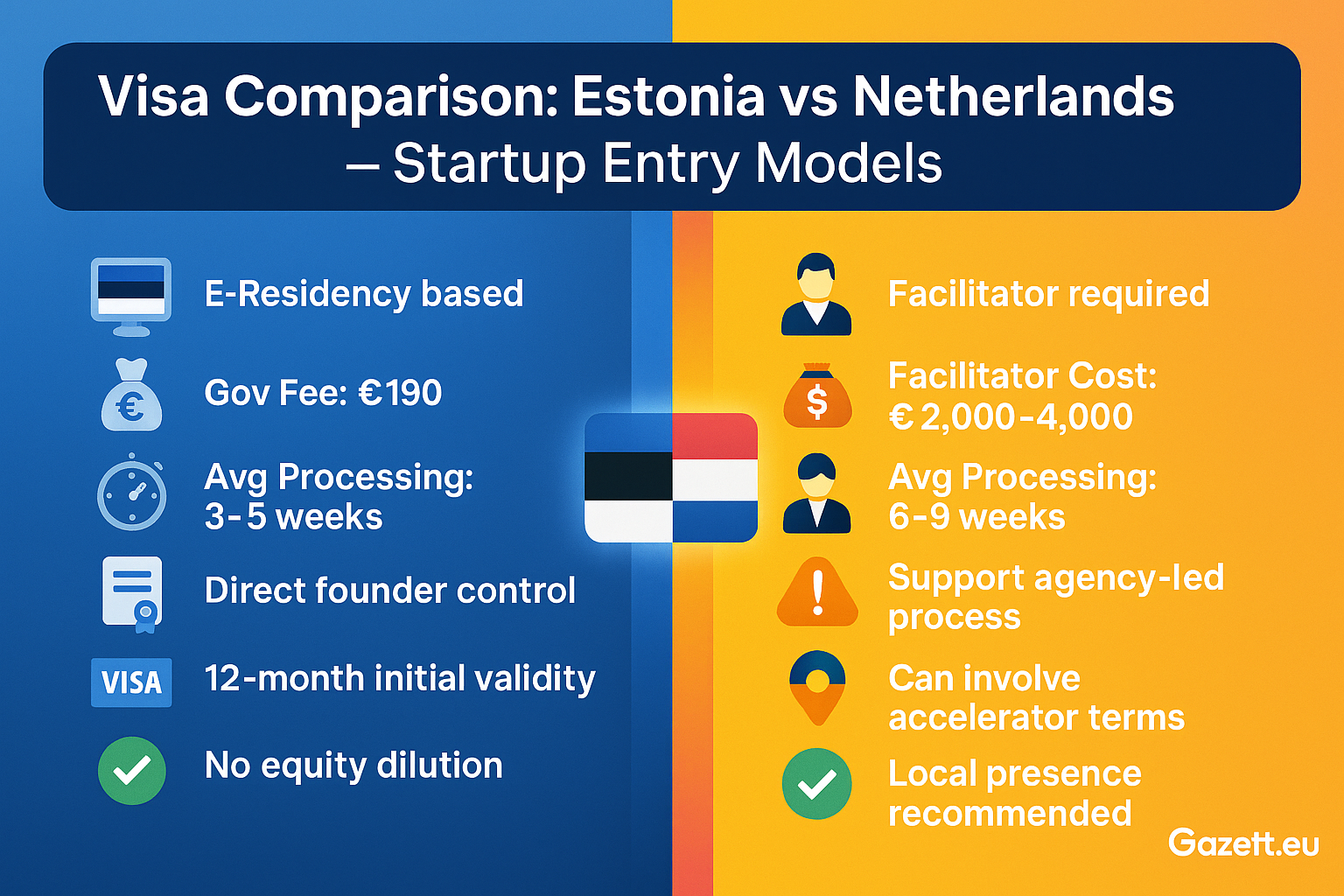
📊 Visual: 2025 Startup Visa Comparison – Key Metrics for Estonia vs Netherlands
| Criteria | 🇪🇪 Estonia | 🇳🇱 Netherlands |
|---|---|---|
| Entry Model | Founder-Led | Facilitator-Guided |
| Application Time | 10–30 days | 4–8 weeks |
| Setup Type | Fully Remote Possible | Physical Presence Expected |
| Key Requirement | Approved Startup Idea | Facilitator Partnership |
| Cost to Start | €190–€350 (gov + e-Residency) | €1,200+ (residency, legal, facilitator) |
| Success Rate | 48% (2023 Startup Committee stats) | 56% (2023 IND records) |
| Visa Duration | 1 Year (Extendable to 5) | 1 Year (Convertible after review) |
✅ Founder Tip: If you’re a solo entrepreneur looking to scale remotely with minimal bureaucracy — Estonia offers the cleanest path. If you want ecosystem guidance, local VC exposure, and deep EU presence — Netherlands is worth the facilitator cost.
🌐 Ecosystem Showdown – Tallinn vs Amsterdam
Startup founders often overlook a critical factor: the ecosystem they’re entering. Both Tallinn and Amsterdam offer excellent support — but their ecosystems cater to different founder mindsets. Here's a side-by-side comparison of what truly matters when you're building from scratch.
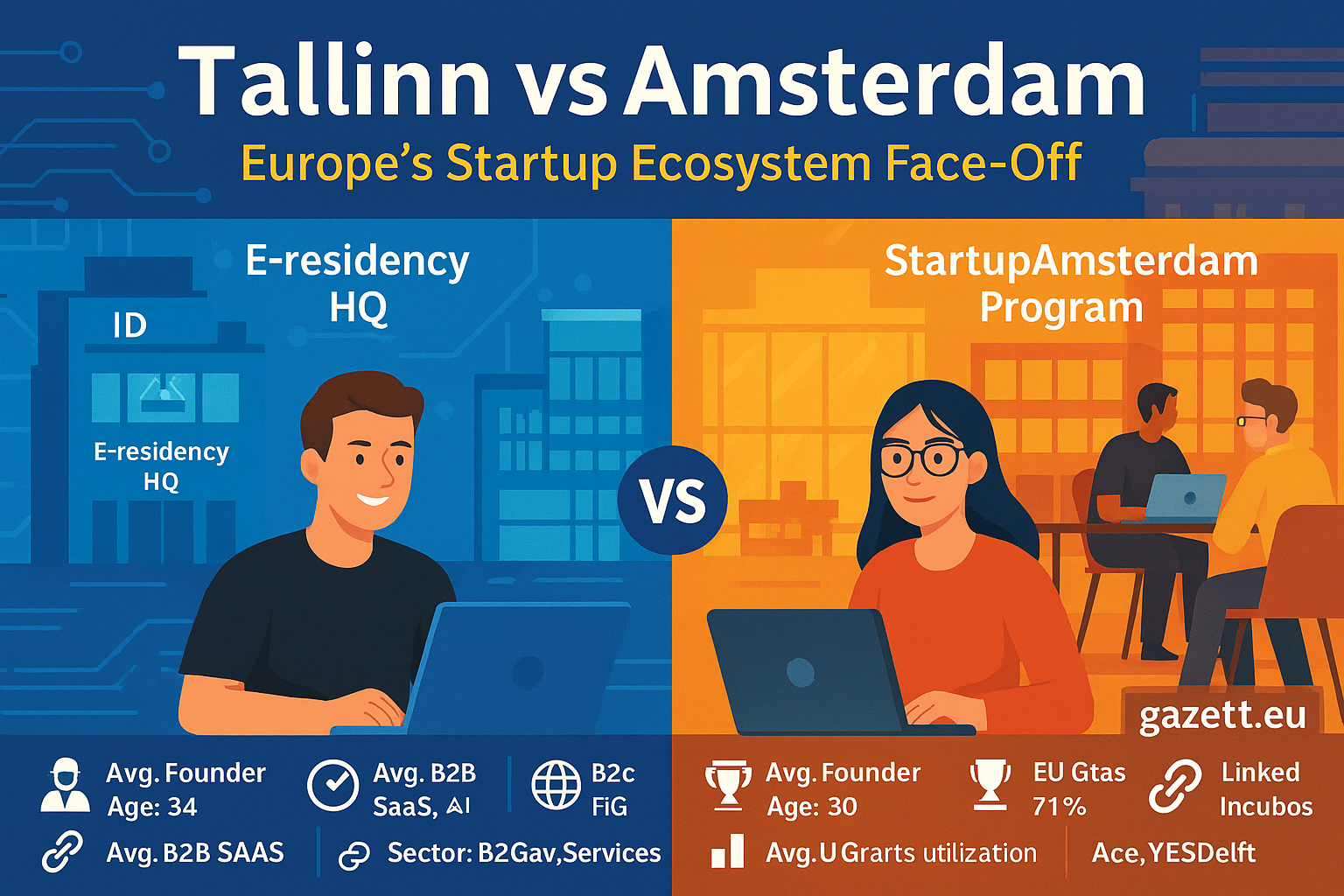
📷 Infographic: Ecosystem Comparison – Tallinn vs Amsterdam (Support, Talent, Events, Funding)
🇪🇪 Tallinn
- Founder Density: High among lean, remote-first teams
- Events: Latitude59, Tehnopol Launchpad
- Talent: Specialized in cybersecurity, AI, DevOps
- Community: Close-knit, easy to access mentors
- Gov Support: Digital public services, fast permits
- Funding: Early-stage friendly, low competition
🇳🇱 Amsterdam
- Founder Density: Very high, multi-sector and global
- Events: TNW, Amsterdam Capital Week
- Talent: Broad access to EU tech, creative workers
- Community: Large-scale, ecosystem-driven
- Gov Support: Grants + incubators via StartupDelta
- Funding: Angel/VC-rich, strong scale-up support
💡 Takeaway: Tallinn is ideal for founders who value autonomy and digital tools. Amsterdam is better suited for those seeking investor networks, grant access, and an active founder community.
👩💻 Real Founder Outcomes & Startup Success Rates
Beyond visa approvals, what truly matters is how founders succeed once inside the system. Here’s how Estonia and the Netherlands compare in 2025 based on conversion metrics, exit visibility, sectoral depth, and founder retention — drawn from government portals, incubators, and visa partners.
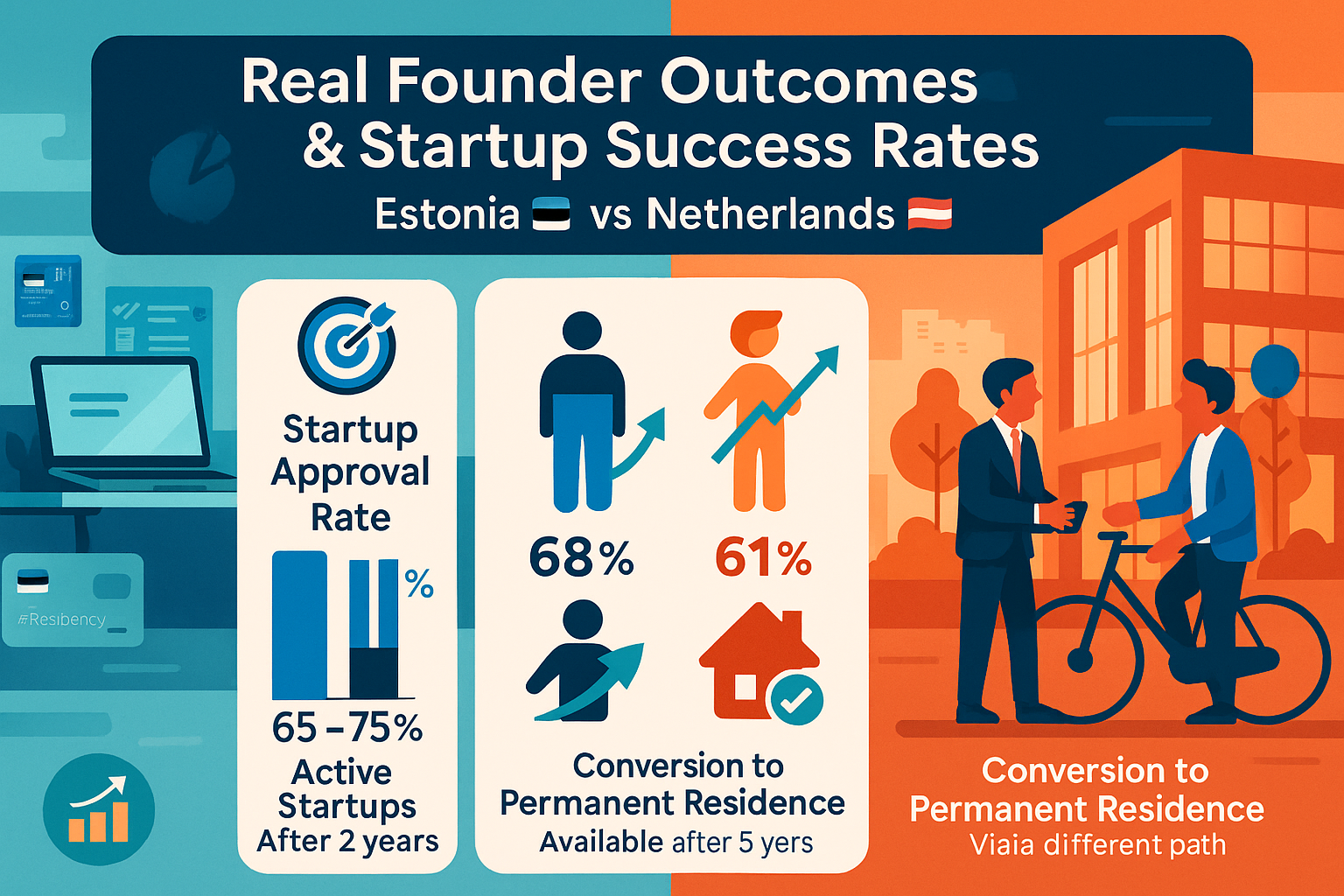
📷 Infographic: Real Founder Outcomes – Conversion Rates, Unicorns, Retention | 2025 Snapshot
🇪🇪 Estonia – Results at a Glance
- Visa-to-Business Conversion: 63% success rate (2023–24)
- Unicorns per capita: 7 unicorns from ~1.3M population
- Top Sectors: Cybersecurity, SaaS, E-Government, B2B
- Notable Platforms: Veriff, Wise, Bolt
- Post-Visa Retention: ~71% of founders remain after 3 years
🇳🇱 Netherlands – Results at a Glance
- Visa-to-Business Conversion: 52% under facilitator model
- Startup Density: Over 6,000 tech startups (2024)
- Top Sectors: ClimateTech, Mobility, Health, CreativeTech
- Notable Platforms: Picnic, MessageBird, Adyen
- Post-Visa Retention: ~79% with local funding support
✅ Founder Insight: Estonia has higher founder-led conversion rates and unicorn density, while the Netherlands excels in long-term retention and cross-sector scale-up opportunities. Your ecosystem preference will shape your odds of success.
🧭 Which Visa Should You Choose in 2025?
Choosing between Estonia and the Netherlands depends on your startup stage, team structure, and how independently you want to operate. Here's a strategic founder guide to help you align your priorities with the right ecosystem in 2025.
🇪🇪 Estonia – Best For You If:
- You’re a solo founder or small remote team
- You want full control without facilitator dependency
- You prefer lean, digital-first operations (via e-Residency)
- Your startup is in fintech, SaaS, or cybersecurity
- You want predictable compliance and low bureaucracy
🇳🇱 Netherlands – Best For You If:
- You want active mentorship via approved facilitators
- Your team needs to access EU investor networks
- You’re building in healthtech, mobility, or clean energy
- You aim to scale quickly across EU markets
- You seek co-working, funding access, and ecosystem events
🧩 Founder Tip: Estonia works best for digital-first, low-touch founders seeking sovereignty and speed. Netherlands is ideal if your journey thrives on ecosystem energy, structured guidance, and multi-stakeholder momentum.
📋 Visual Matrix + Decision Chart
Here’s a founder-friendly matrix comparing Estonia and the Netherlands across all key factors — from visa setup to ecosystem access, startup support, and long-term success. Use this table as your decision compass for 2025.
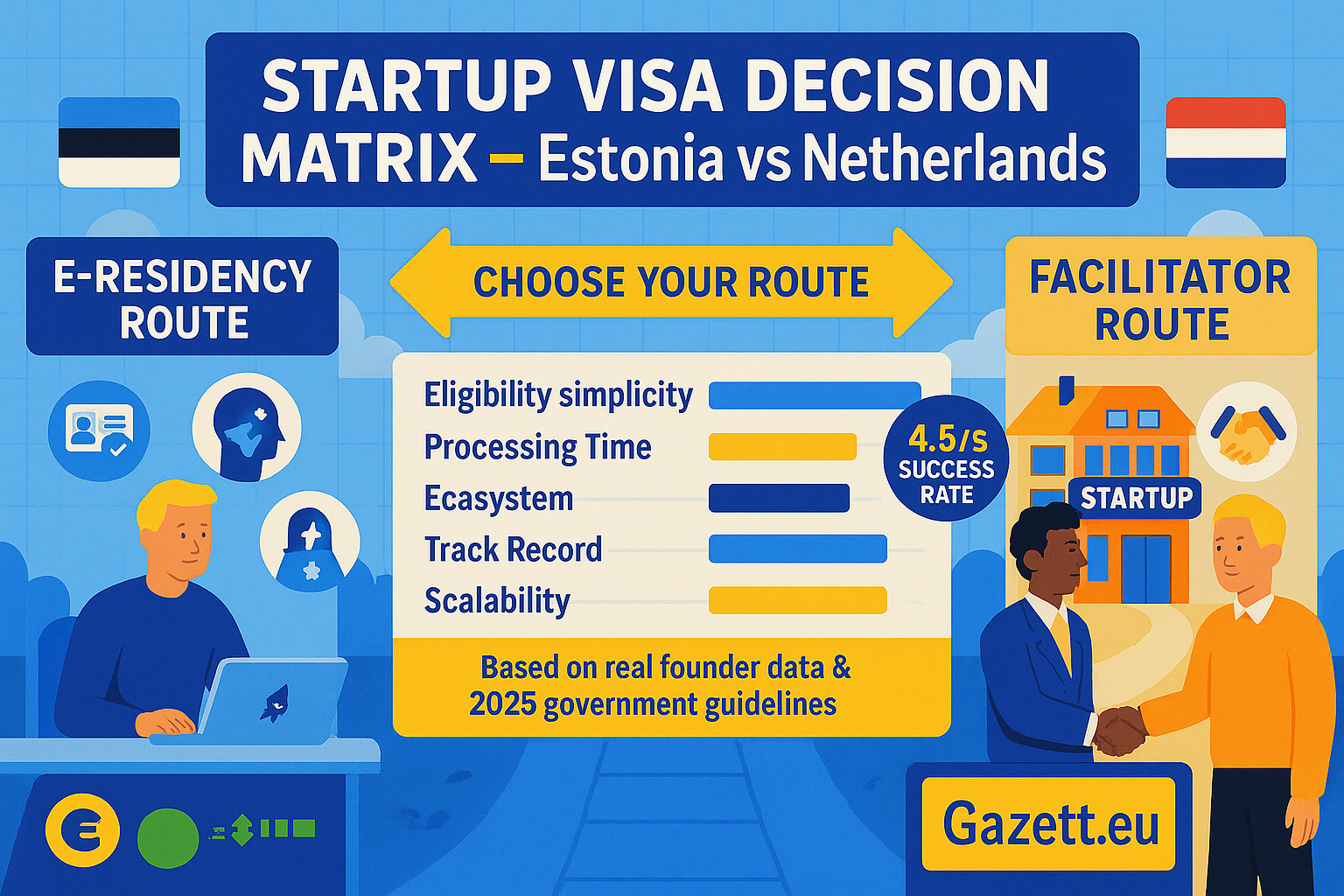
📷 Visual Matrix: Visa Setup, Mentorship, Ecosystem Depth & Success Metrics – Verified by Gazett.eu
- ✅ Best for Solo Founders: Estonia (no facilitator needed, direct application)
- ✅ Best for VC-Backed Startups: Netherlands (ecosystem & investor access)
- ✅ Fastest Setup: Estonia (48–72 hrs with e-Residency)
- ✅ Strongest Mentorship Network: Netherlands (recognized facilitator model)
- ✅ Most Digital-Friendly: Estonia (fully remote onboarding + company registration)
- ✅ Highest Retention Rate: Netherlands (founders stay beyond year 3)
Still undecided? Review your team’s visa preferences, support needs, funding expectations, and long-term EU market ambitions. Match that to the core strength of each country’s startup entry model.
📌 Conclusion – Takeaways, Tools & Links
As Europe intensifies its push to attract global founders, startup visa programs have become strategic entry tools — especially in digitally mature economies like Estonia and ecosystem-rich hubs like the Netherlands. Your best fit depends on how much independence, guidance, and long-term opportunity your venture needs.
- 📍 Estonia: Ideal for remote-first, bootstrap founders who value speed and autonomy
- 📍 Netherlands: Best for accelerator-driven, VC-leaning teams seeking structured support
- 📍 Both: Offer clear pathways to residence, growth, and EU market access in 2025
- 📍 Strategy Tip: Compare with your startup grant goals and entity structure
🔗 Official Tools & Application Pages
- Estonia Startup Visa – StartupEstonia.ee
- Netherlands Startup Visa – Business.gov.nl
- Immigration & Naturalisation Service (Netherlands)
- Estonian e-Residency Portal
Sources: Startup Estonia | Dutch Facilitator Network | Y Combinator Blog | OECD Startup Visa Tracker | European Migration Network Reports